Related Research Articles

The military saints, warrior saints and soldier saints are patron saints, martyrs and other saints associated with the military. They were originally composed of the early Christians who were soldiers in the Roman army during the persecution of Christians, especially the Diocletianic Persecution of AD 303–313.

Saint Nilus the Elder of Sinai was one of the many disciples and stalwart defenders of St. John Chrysostom.

Gorgonius or Gorgon was a Christian who was martyred in AD 304 alongside Peter Cubicularius and a certain Dorotheus at Nicomedia during the Diocletianic Persecution.

The deacon Apollonius and his convert Philemon were Christian martyrs of the Diocletianic Persecution around 303. Philemon was a famous flute player, mime and actor at Antinoöpolis in Egypt.
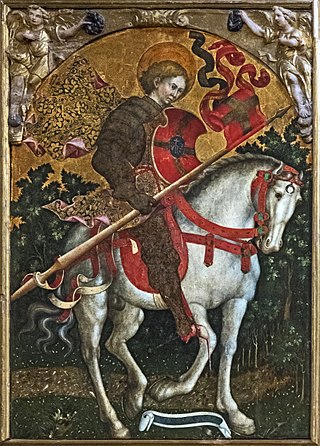
Saint Chrysogonus is a saint and martyr of ancient Rome venerated by the Catholic Church and the Eastern Orthodox Church.

Saints Cyprian and Justina are honored in the Catholic Church, Eastern Orthodox Church and Oriental Orthodoxy as Christians of Antioch, who in 304, during the Diocletianic Persecution, suffered martyrdom at Nicomedia on September 26. According to Roman Catholic sources, no Bishop of Antioch bore the name of Cyprian.

Sabinus of Spoleto was a bishop in the early Christian church who resisted the Diocletianic Persecution and was martyred.

Saint Colluthus is a Coptic saint and martyr of the 3rd century AD said to be from Antinoöpolis.

Psote, also known as Bisada, Besada, Psate/Psati, Abashadi, Abassadius, or Beshada, was a bishop of Ebsay in Upper Egypt. He was martyred by beheading at Antinoe. St. Apa Psote was a revered Coptic Orthodox bishop from the city of Psoi, known for his devout faith and martyrdom during the Diocletianic Persecution, a time of severe repression against Christians in the Roman Empire.
Rictius Varus was a Vicarius in Roman Gaul at the end of the 3rd century, around the time of the Diocletianic Persecution. The Roman Martyrology contains many references to the prefect Rixius Varus, who is said to have persecuted hundreds of Christians. In Christian hagiography he later repented and became a Christian martyr himself, and is regarded a Saint in the Eastern Orthodox and Roman Catholic Churches, with his feast day on July 6.
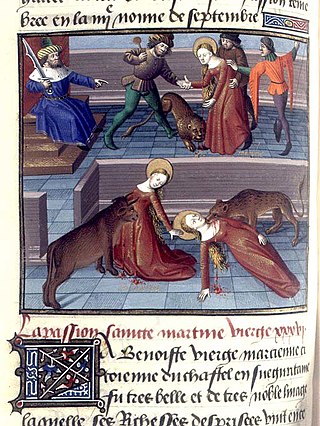
Marciana of Toledo, also known as Marciana of Mauretania and Marciana of Caesarea, is venerated as a martyr and saint.
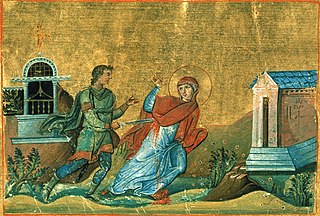
Saint Anysia of Thessalonica was a Christian virgin and martyr of the 4th century. She was born of pious and affluent parents who "raised her in Christian piety". They died when Anysia was young, leaving her their wealth, which she distributed to the poor, choosing to live "a strict life of fasting, vigil, and prayer".
Saint Domnina and her daughters Berenice and Prosdoce are venerated as Christian martyrs by the Roman Catholic and Eastern Orthodox Churches. St. Domnina is not to be confused with Domnina of Syria, a 5th century figure.
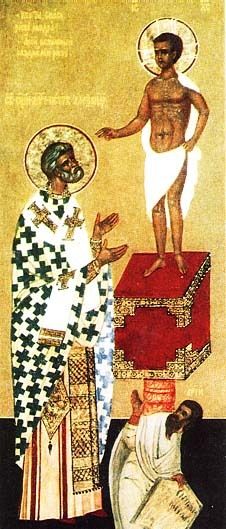
Pope Peter I of Alexandria was the 17th Pope and Patriarch of Alexandria from 302 to 311. He is revered as a saint by the Coptic Orthodox Church, the Eastern Orthodox Church, and the Catholic Church.
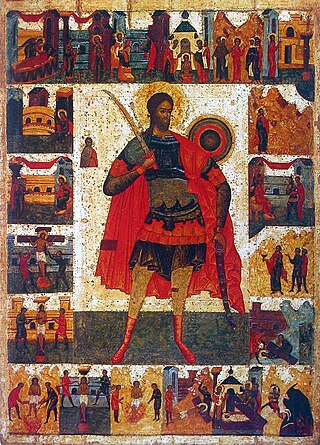
Nicetas is a Christian martyr of the 4th century, venerated particularly in the Eastern Orthodox Church. His feastday is 15 September. Nicetas was of Gothic origin, living during the 4th century AD. His life spanned the years of Emperor Constantine the Great's sole rule. He belonged to the upper social class of his people. Nicetas was instructed in Christianity by Theophilus of Gothia, a converted bishop, between 325 and 341 AD.

Saint Peleus was an early Christian martyr. An Egyptian bishop, Peleus was one of four Christians who led Mass for the persecuted Christians condemned to work in the Palestinian quarries in the wake of the Diocletianic Persecution. When the Roman emperor Galerius learned of this, he had Peleus burned alive along with the other leaders, and the Christians dispersed to mines in Cyprus and Lebanon. He is venerated as a saint in the Roman Catholic Church, Eastern Orthodox Church and Coptic Orthodox Church.
Elias of Palestine was an early Christian martyr. A priest, Elias was one of four Christians who led Mass for the persecuted Christians condemned to work in the Palestinian quarries in the wake of the Diocletianic Persecution. When the Roman emperor Galerius learned of this, he had Elias burned alive along with the other leaders, and the Christians dispersed to mines in Cyprus and Lebanon. He is venerated as a saint in the Roman Catholic Church and Eastern Orthodox Church.
Patermutius was an early Christian martyr. A layman, Patermutius was one of four Christians who led Mass for the persecuted Christians condemned to work in the Palestinian quarries in the wake of the Diocletianic Persecution. When the Roman emperor Galerius learned of this, he had Patermutius burned alive along with the other leaders, and the Christians dispersed to mines in Cyprus and Lebanon. He is venerated as a saint in the Roman Catholic Church and Eastern Orthodox Church.
Pelagia the Virgin, also known as Pelagia of Antioch, was a Christian saint and virgin martyr who leapt to her death during the Diocletianic Persecution in refusal to offer a public sacrifice to the pagan gods by Roman soldiers, or to do "something unspeakable ", typically inferred as the Roman soldiers attempting to rape her. She is venerated as a saint in the Eastern Orthodox Church and Roman Catholic Church.
Neophytos was born in Nicaea of Bithynia to Christian parents who were named Theodore and Florentia. During the Diocletianic Persecution he went to Nicaea and boldly denounced the pagan faith. He was killed by Roman soldiers in A.D. 303, 10 years before the Edict of Milan permanently established religious toleration for Christianity within the Roman Empire. His feast day is commemorated on January 21.
References
- ↑ Butler, Alban (December 1, 1956). Butler's Lives of the Saints (New Full ed.). St John's Abbey, Collegeville, Minnesota: Christian Classics. p. 181. ISBN 0-8146-2385-9.